Darren also plays on this album available from Gare Du Nord.

The official website for the band Hefner and songwriter Darren Hayman
Darren also plays on this album available from Gare Du Nord.

I liked this remix by Alistair Hill very much so decided to share it with you.
Alistair Hill
Inspired by folk music, analogue synthesis and Downland paths, he records happy accidents in a living room in Brighton, England.
http://soundcloud.com/sundog70
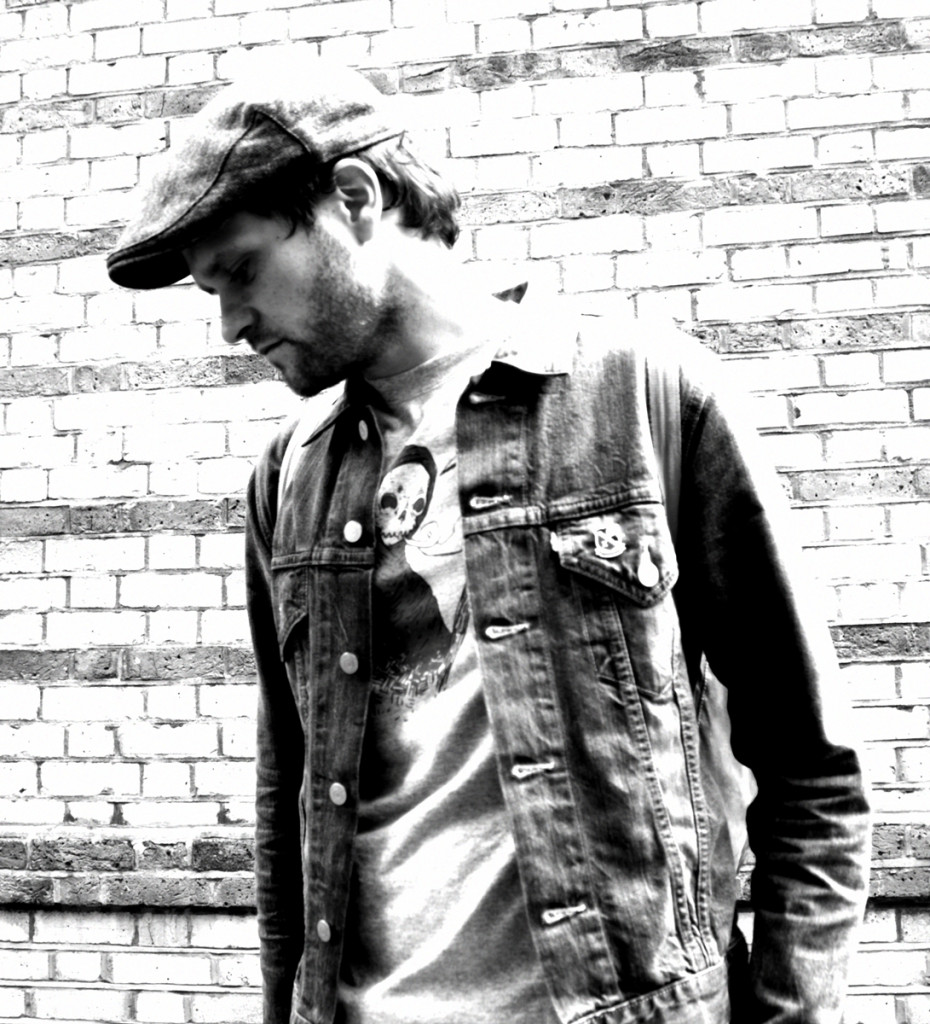
I sometimes forget to feature my extra curricular activities here. Fulhäst is my good friend Nik Vestburg and it’s a strange mix of stark, bare, heartbroken lyrics and blut, brutal Gameboy music. I spent two days recording his album ‘Broken’ back in January.
My and Nik almost have no shared fram of reference. He likes horror movies and Swedish punk rock. I like Free jazz and alternate guitar tunings.
But we work well and fast together. We are going to do more stuff together again soon.
The easiest introduction to Nik might be this remix I did for him.
However I would advise you to avoid my sweetening and drink some neat Fulhäst.
Here you go….
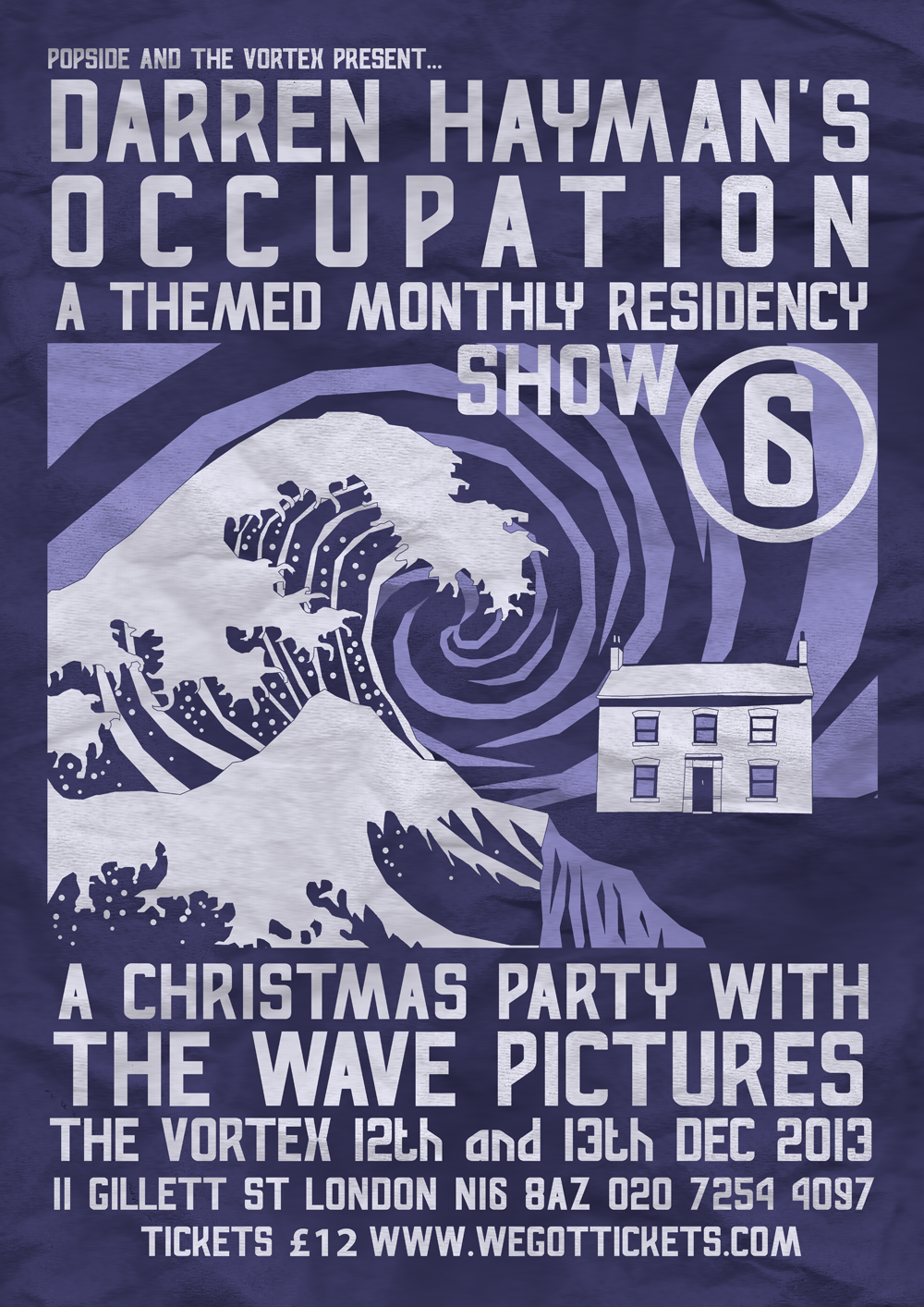
Occupation Show 6 at the Vortex Club will be over two nights on the 12th and 13th December. Darren will be playing sets with The Wave Pictures.
It’s a long time ago not but when the Wave Pictures first moved to London back in 2006 for a short while there were the original Secondary Modern. Darren took them to Spain with him and they also did a few UK shows. Since then they have collaborated regularly, playing on each others records and Darren directing Wave Pictures videos.
In 2011 they made a single together ‘Who Hung the Monkey’, part of the January Songs project.
To make the show extra special we are going to try and organise a secret santa event. Every ticket holder should try and bring a £5 ish present and all of the presents will be swapped and distributed throughout the night.
THE SETS ON BOTH NIGHTS WILL BE LARGELY SIMILAR.
Thursday 12th December http://www.wegottickets.com/event/242735
Friday 13th December http://www.wegottickets.com/event/242738
The Vortex
11 Gillett Square, London N16 8AZ
www.vortexjazz.co.uk
Doors 8pm
£12 Adv
www.hefnet.com
@DarrenHayman
@VortexJazz
@ThePopside
Darren Hayman’s Occupation is a series of monthly shows at The Vortex, Dalston. There will be a mix of sets showcasing different albums, themes and special guests. This is not your standard indie gig:
“I love gigs. I hate gigs.
I want to play live and I love what shows can be, but I’ve found myself frequently stifled by the limitations of my career. I can’t play the plush, seated venues and I can’t experiment with a string section or play 20 minute opuses.
My music was born in the sticky floored rock venue. I like the sticky floored rock venue but I have had a hankering for something different recently. My own taste has veered towards free improv and jazz and although it’s hard to imagine that music influencing my own I do love the culture of live music in this genre.
Long sets, sometimes two, comfortable venues and a reverence and respect for the event and the moment; less talking, less cameras, more dynamics, less microphones.
I wondered if these would let an indie rock interloper amongst their ranks. My show at the Vortex back in last November was successful enough to make me think of playing a monthly residency there.
The idea is that each show is themed. I don’t want to go the whole predictable route of playing complete albums, but rather group, types of songs together for different evenings. Experiment, sometimes play two sets, sometimes have unlikely guests. I will be playing with members of my bands from through out my career as well as old friends like the Wave Pictures and Allo Darlin.
The Vortex is a beautiful venue. I’m trying to do something different; something, smaller, prettier. I hope you can come.”
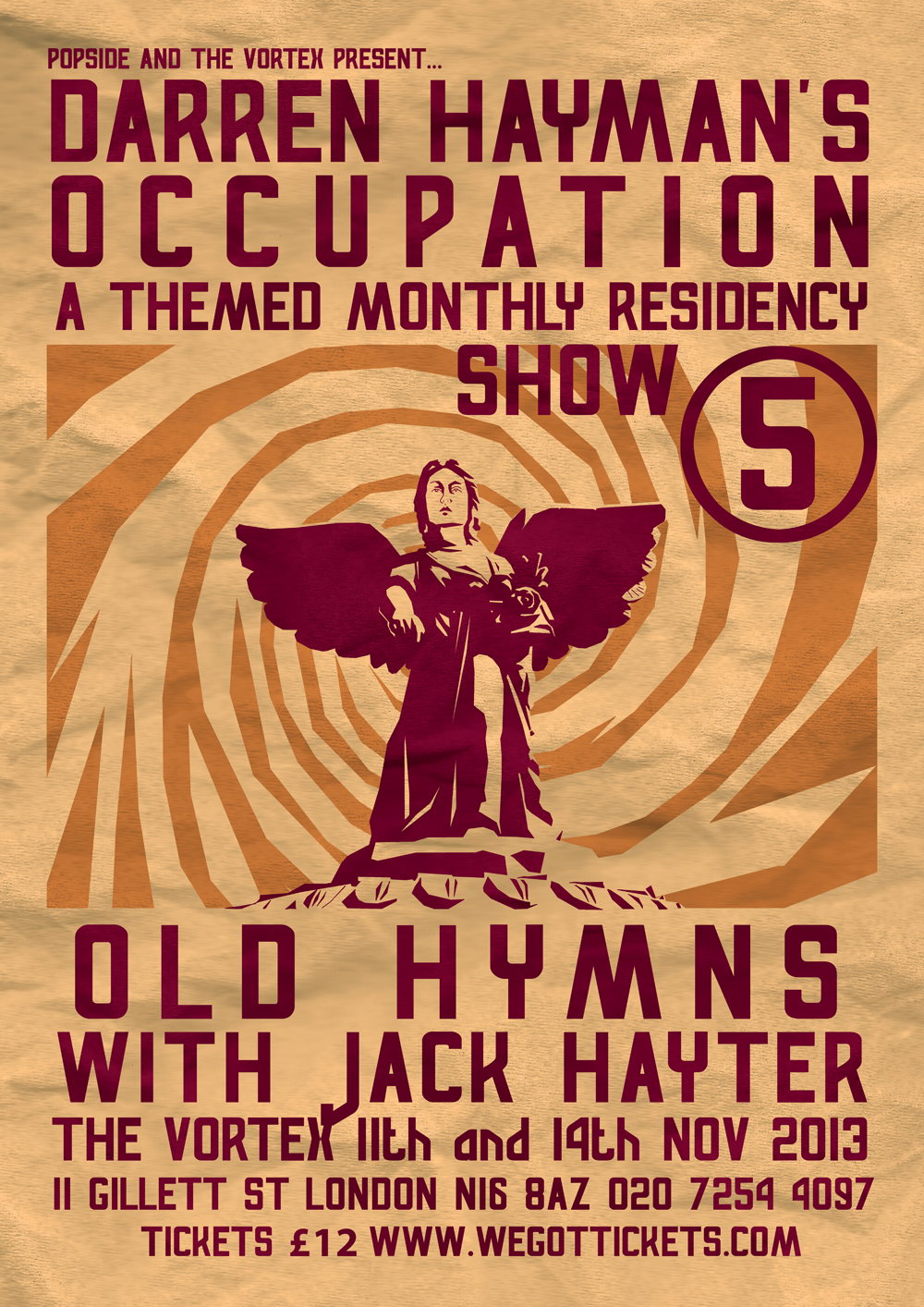
For the fifth Occupation show we are expanding to two nights; 11th and 14th NOVEMBER
The theme this time is simple, Darren and his old bandmate Jack Hayter will play the songs of their old band Hefner. Darren and all the members of Hefner have remained firm in their intention that the band will never reform and even nights like these are very rare. The last time Jack and Darren played sets like this was in 2008.
This time Jack and Darren hope to turn their attention to the softer side of Hefner. Less Hello Kitten, more Hymn for the Alcohol.
ALTHOUGH THEY ARE PLAYING TWO NIGHTS THE SETS ON BOTH NIGHTS WILL BE LARGELY SIMILAR.
Support on 11th is from Papernut Cambridge. An awesome new band, formed in a dream and sometimes featuring Darren himself.
http://www.wegottickets.com/event/241421
Support on 14th is from Jack Hayter playing his own songs.
http://www.wegottickets.com/event/241422
All tickets here www.wegottickets.com/popside
The Vortex
11 Gillett Square, London N16 8AZ
www.vortexjazz.co.uk
Doors 8pm
£12 Adv
www.hefnet.com
@DarrenHayman
@VortexJazz
@ThePopside
Darren Hayman’s Occupation is a series of monthly shows at The Vortex, Dalston. There will be a mix of sets showcasing different albums, themes and special guests. This is not your standard indie gig:
“I love gigs. I hate gigs.
I want to play live and I love what shows can be, but I’ve found myself frequently stifled by the limitations of my career. I can’t play the plush, seated venues and I can’t experiment with a string section or play 20 minute opuses.
My music was born in the sticky floored rock venue. I like the sticky floored rock venue but I have had a hankering for something different recently. My own taste has veered towards free improv and jazz and although it’s hard to imagine that music influencing my own I do love the culture of live music in this genre.
Long sets, sometimes two, comfortable venues and a reverence and respect for the event and the moment; less talking, less cameras, more dynamics, less microphones.
I wondered if these would let an indie rock interloper amongst their ranks. My show at the Vortex back in last November was successful enough to make me think of playing a monthly residency there.
The idea is that each show is themed. I don’t want to go the whole predictable route of playing complete albums, but rather group, types of songs together for different evenings. Experiment, sometimes play two sets, sometimes have unlikely guests. I will be playing with members of my bands from through out my career as well as old friends like the Wave Pictures and Allo Darlin.
The Vortex is a beautiful venue. I’m trying to do something different; something, smaller, prettier. I hope you can come.”
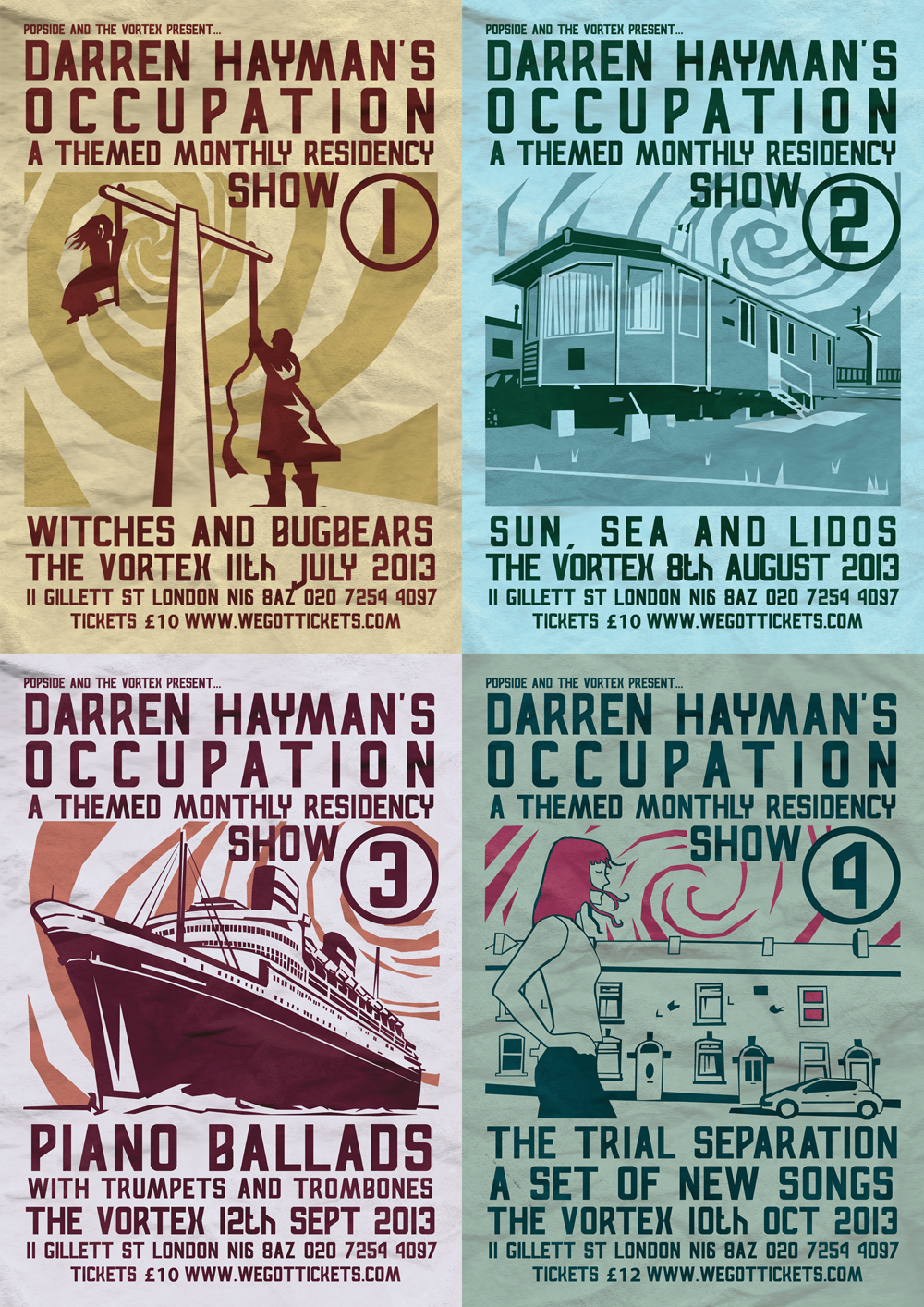
You can now buy the first four Occupation posters. The posters are A4 and will be sent in a strong cardboard tube.
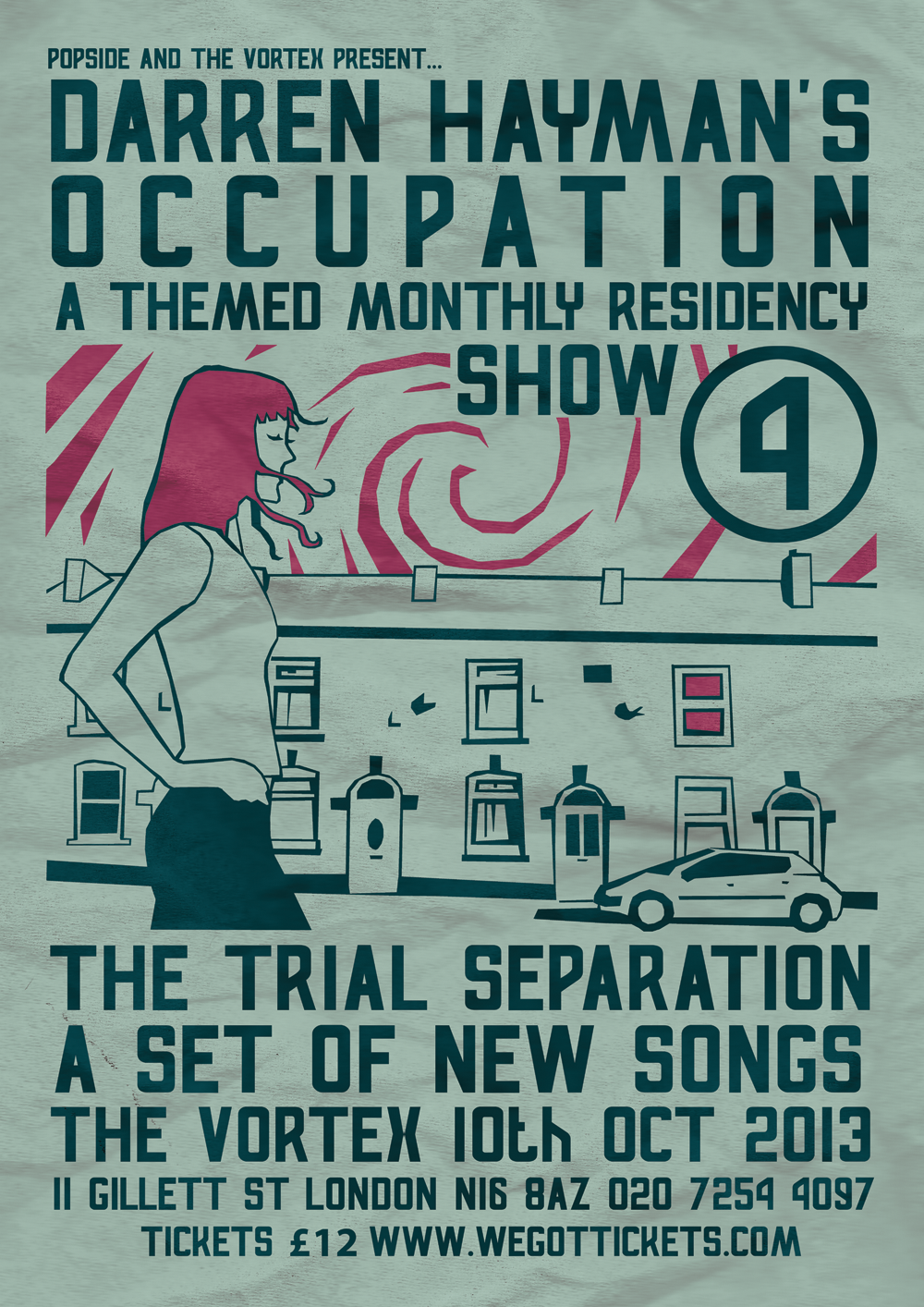
One part of the Occupation idea is that we would do things we had never done before. That in getting used to the venue we would be spurred on to do new and experimental things. So far at each of the shows we have performed new songs. On October the tenth we take this one step further with a whole night of new song.
During August we hope to record all of these songs in a chapel in Wales. The songs are more loosely themed than recent albums but the songs do have a thread running through them. Soft pulsing hymns of regret.
These are songs about love gone wrong. A break up album. Please come and see us play a whole set of new songs on October 10th.
http://www.wegottickets.com/event/235168
The Vortex
11 Gillett Square, London N16 8AZ
www.vortexjazz.co.uk
Doors 8pm
£12 Adv
www.hefnet.com
@DarrenHayman
@VortexJazz
@ThePopside
Darren Hayman’s Occupation is a series of monthly shows at The Vortex, Dalston. There will be a mix of sets showcasing different albums, themes and special guests. This is not your standard indie gig:
“I love gigs. I hate gigs.
I want to play live and I love what shows can be, but I’ve found myself frequently stifled by the limitations of my career. I can’t play the plush, seated venues and I can’t experiment with a string section or play 20 minute opuses.
My music was born in the sticky floored rock venue. I like the sticky floored rock venue but I have had a hankering for something different recently. My own taste has veered towards free improv and jazz and although it’s hard to imagine that music influencing my own I do love the culture of live music in this genre.
Long sets, sometimes two, comfortable venues and a reverence and respect for the event and the moment; less talking, less cameras, more dynamics, less microphones.
I wondered if these would let an indie rock interloper amongst their ranks. My show at the Vortex back in last November was successful enough to make me think of playing a monthly residency there.
The idea is that each show is themed. I don’t want to go the whole predictable route of playing complete albums, but rather group, types of songs together for different evenings. Experiment, sometimes play two sets, sometimes have unlikely guests. I will be playing with members of my bands from through out my career as well as old friends like the Wave Pictures and Allo Darlin.
The Vortex is a beautiful venue. I’m trying to do something different; something, smaller, prettier. I hope you can come.”